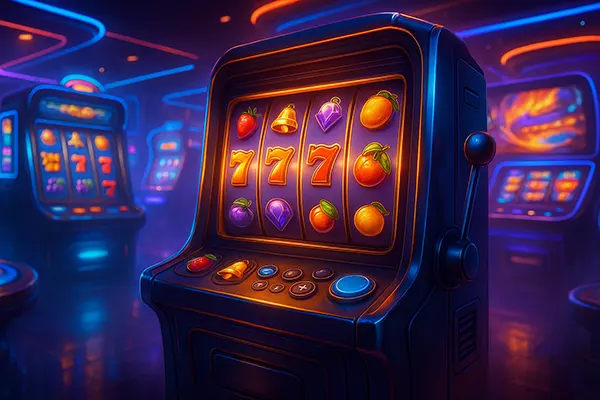
How Slot Mechanics Are Changing in 2025: From Classic Reels to Interactive Narratives
In 2025, the world of slot games is undergoing a remarkable transformation. The evolution from mechanical reels to immersive, story-driven experiences reflects not only technological progress but also the changing expectations of players. Today’s developers aim to merge entertainment with engagement, creating digital experiences that go far beyond mere spinning symbols.
The Rise of Advanced Slot Mechanics
Slot games have come a long way from simple fruit machines. Over the past decade, innovations such as cascading reels, Megaways, and cluster pays have reshaped the industry’s foundations. In 2025, the focus has shifted towards dynamic reel structures and personalised gameplay that adapts in real time based on player behaviour.
Modern slots now integrate AI-driven systems that adjust difficulty levels, bonus frequency, and even visual aesthetics depending on how players interact. These features ensure a more tailored experience, increasing satisfaction and longevity without compromising fairness or randomness. The use of adaptive algorithms has become standard practice among leading developers.
Additionally, slot engines now rely on hybrid RNG models. These systems combine traditional random generation with predictive patterns to maintain unpredictability while ensuring balanced payout cycles. As a result, players experience fairer sessions without long dry streaks, improving both entertainment value and retention rates.
Integration of Storytelling and Player Agency
In 2025, storytelling has become the core mechanic of many slot titles. Games are now structured like episodic adventures, where each spin unlocks new chapters, environments, and character interactions. This design gives players a sense of progress and agency that traditional slots never offered.
Interactive narratives are supported by cinematic visuals and real-time animation engines similar to those used in modern video games. Players can influence outcomes through decisions during bonus rounds or mini-games, bridging the gap between slots and interactive entertainment. Such mechanics are particularly successful among younger audiences who seek narrative depth and personal involvement.
Developers are also experimenting with multiplayer storytelling features. In some upcoming releases, players can join shared worlds, contributing to collective storylines that evolve over time. This trend aligns with the broader movement towards social and community-driven gaming experiences.
Technological Innovations Driving the Change
The rapid adoption of new technologies has been instrumental in reshaping slot mechanics. Cloud computing allows for faster content delivery, while blockchain integration ensures transparency in payouts and fairness audits. In 2025, almost every reputable developer incorporates these technologies as part of their standard development pipelines.
Virtual and augmented reality are no longer novelties but essential tools for immersion. Players can step into 3D slot environments, interact with objects, and trigger rewards through gestures. VR-based slot lounges, offered by major operators, simulate the atmosphere of physical casinos without the limitations of geography or hardware performance.
Artificial intelligence has also revolutionised quality assurance and game balancing. Developers now use AI simulations to test millions of spins instantly, identifying imbalances and bugs before launch. This automation shortens development cycles while enhancing the reliability and fairness of each release.
The Role of Regulation and Responsible Innovation
As mechanics grow more complex, regulators worldwide are updating frameworks to ensure fairness, transparency, and player protection. In 2025, licensing bodies require detailed algorithm audits and data disclosures from developers. These measures help maintain public trust and prevent exploitative design patterns.
Responsible gaming tools are also evolving. Features like session time reminders, volatility warnings, and AI-driven spending limits are now embedded directly into slot interfaces. These innovations empower users to make informed decisions while promoting sustainable entertainment habits.
Ultimately, innovation in slot mechanics must coexist with ethical design. Developers are increasingly guided by the principle that engagement should not come at the expense of player well-being. As a result, the industry is moving towards a balanced model where creativity and responsibility reinforce one another.

The Future of Slot Experiences
Looking ahead, slot mechanics are expected to blend seamlessly with other forms of digital entertainment. Cross-platform synchronisation allows players to continue their progress across devices, while live data integration ensures real-time updates to leaderboards, achievements, and community challenges.
Another major trend is the inclusion of interactive economies. Players can now earn in-game assets, collectibles, and progression points that hold value within game ecosystems. These systems are carefully designed to comply with international gambling laws, distinguishing them from unregulated digital tokens.
By 2025, the distinction between video games and slots has become increasingly blurred. The modern player is not just seeking a win—they want engagement, narrative, and creative immersion. Developers who understand this shift are setting new standards for what digital entertainment can achieve.
Industry Outlook and Player Expectations
Experts predict that within the next five years, more than half of new slot releases will feature narrative-driven gameplay elements. Players now expect mechanics that evolve, adapt, and surprise them—qualities that define truly next-generation entertainment. This evolution will likely attract a broader audience, including those who previously ignored traditional slot formats.
Collaborations between iGaming developers and mainstream entertainment companies are also becoming common. Studios are acquiring storytelling expertise from film and television to create cross-media experiences that extend beyond the slot itself. Such partnerships elevate both the artistic and commercial potential of the genre.
Ultimately, 2025 marks the point where slot games stop being static gambling tools and evolve into fully interactive digital worlds. Their mechanics reflect not only the progress of technology but also the creative ambition of the modern gaming industry.
